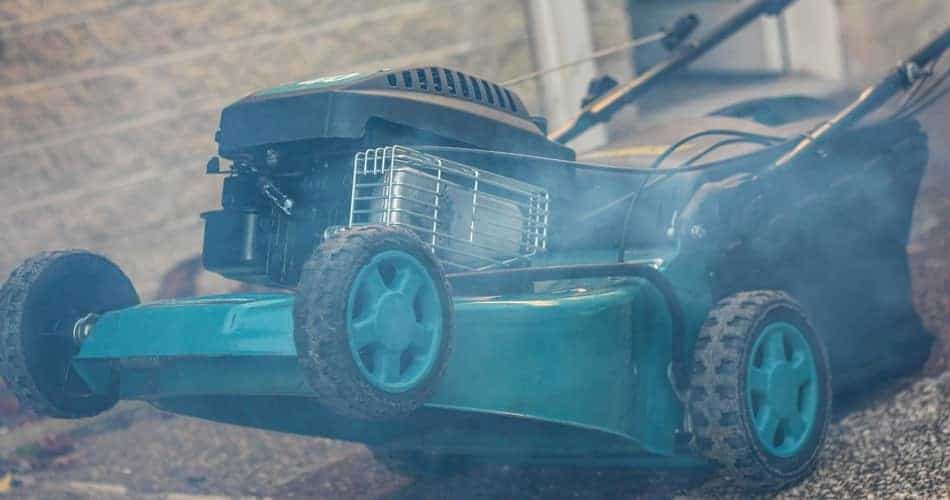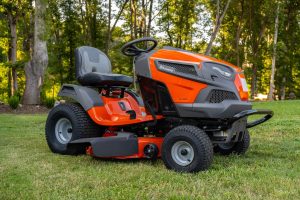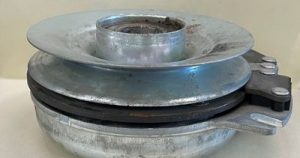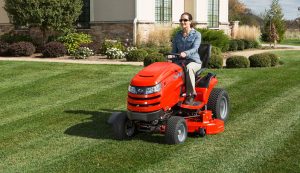5 Reasons Your Lawn Mower May Be Smoking
The first sign of smoke from your lawn mower can be worrisome. Immediately you assume the worse with a very expensive repair ahead. Routine maintenance of your lawn mower engine can keep your engine from smoking.
Let’s see if I can shed some light on some of the known causes of why a lawn mower engine can smoke. A lot of engine problems can be the result of how the engine has been taken care of and the age of the engine. A smoking engine is a great way to keep bugs away, but that’s about the only good thing.
A lawn mower may be smoking due to the air filter being plugged; an insufficient oil level; problems with the valve train or piston ring; or a bad engine gasket.
You should start with the simple items to check before moving on to the more complicated diagnostics.

This post may include affiliate links. Purchases made through these links may provide a commission for us, at no extra cost to you. As an Amazon Associate, we earn from qualifying purchases.
Follow all safety instructions provided in your equipment operator’s manual prior to diagnosing, repairing, or operating.Consult a professional if you don’t have the skills, or knowledge or are not in the condition to perform the repair safely.
Table of Contents
Reasons Why Your Lawn Mower May Be Smoking
1. Air Filter System is Plugged
If my engine was smoking the first Item I would check is the air filter system. This is the easiest thing to check so why not start there?
- First, remove the air filter cover. The cover is always located above the carburetor so that it can pull in clean air. Depending on the type of mower you have, the cover usually has a single screw or two knobs holding it down.
- Some air filters will be along the side of the engine next to the carburetor.
- Pull the filter out being very careful not to let any dirt fall into the intake pipe when you remove the filter.
- Inspect the filter and check to see if it is full of dirt and grass. If it is, the engine will not be able to breathe. Instead of pulling in the fresh air, a clogged filter will bring in air from the engine crankcase or the internal part of the engine.
The air that comes from the engine can pull up oil with it. The burning of this oil can create smoke.
- If your air filter is clogged, you need to replace it. If the air filter doesn’t look too bad, knock the dirt out of it and reinstall it. I explain the cleaning procedures here.
2. Insufficient Engine Oil Level
If the air filter is not the problem, the next thing you are going to check is the engine oil. Now you may be asking yourself why you are checking the oil. If your engine oil is lower or higher than the manufacturer’s recommended oil level it can result in smoking.
Low Oil Level
If your engine oil is low, you could be burning up the engine due to extreme heat which causes it to smoke. In this case, the engine is having a meltdown and burning up the small parts in the engine.
You can try to add fresh oil to see if the smoking stops, but most of the time, at this stage, it is often too late for this simple solution.
High Oil Level
Having too much oil can cause too much crankcase pressure which causes oil to get back into the cylinder or even up to the air intake through the valve train.
In this case, the oil is getting into the cylinder and begins to burn off when the engine is running at full speed creating smoke. You need to drain some oil out of the engine to resolve this problem.
Read more about the engine damage from adding too much oil to your lawn mower can cause. “This is What Happens If You Put Too Much Oil in a Lawn Mower”.
3. Piston Ring Problem
After checking the easier troubleshooting steps and not finding any problem with the air filter or oil level, the next thing to do is check for oil on the spark plug. To do this, you will need a socket to remove the spark plug.
You may need a 3/4″ or 5/8″ socket to remove the plug. Inspecting the plug isn’t going to tell us a lot about the type of engine problem you have but pulling out the spark plug and checking to see if there is excessive oil buildup on it indicates you have a larger internal engine problem.
If you are mechanically inclined, you could check for internal engine damage. I recommend bringing your mower to a small engine dealer repair shop if you are not. If you find a lot of oil on the spark plug you may have a piston ring or valve train problem.
Either problem will result in you having to take the engine apart. A spark plug with oil build-up can indicate there is a ring problem and a score inside the cylinder wall. If the cylinder has a score in it, the engine can bring up the oil to the combustion chamber and begin burning it.
This will create smoke while in use. You may have to replace the engine in this situation.
4. Valve Train Problem
Sometimes having a valve train problem is not that bad of a problem to have. The only way to detect this is by removing the cylinder head or performing a leak-down test. This should be completed by a small engine mechanic.
The cause of a valve train problem is the result of the valve getting burned by being overheated. The edges of the valve begin to fall apart due to the heat. This is what is often referred to as a burnt valve.
You can also see a burnt valve or timing problem if the muffler is glowing red from heat while the engine is running. In this case, you will need to replace the valve and grind the seat. The seat is where the valve contacts the engine block to complete the combustion chamber.
Both the valve and the seat will have to be cut at certain angles in order to make the valve seat correctly.
5. Bad Engine Gasket
A bad engine gasket may leak oil onto the muffler and make the engine smoke as it burns. You will need to find the bad gasket and replace it. This may sound easier than it actually is. It becomes increasingly more difficult depending on the location of the bad gasket.
Difference Between Blue and Black Smoke in Your Lawn Mower Engine
Sometimes the color of the smoke can give you an idea of what kind of engine problem you are dealing with. It is best to go through the checklist above to narrow down the issue, but here is a quick list of items that could be causing the smoke.
Black Smoke
This color usually is due to the engine running too rich. This is when there is more fuel being burned than air so the first thing to check is the air filter and clean or replace it. If this isn’t the issue check for another air flow restriction.
Blue or White Smoke
This color smoke is due to burning excess oil. It is best to follow the steps above to identify the root cause starting with checking the engine oil level followed by checking for damage to the piston rings, valve train, or engine gasket.
It is important to continue to check your engine oil level and air filter before each mowing use to avoid large expensive repairs. For a checklist to perform before each mowing I explain it in my Lawn Mower Checklist.
Complete Regular Engine Oil Changes
It may seem like a lot of work to change your engine oil, but changing your oil is necessary. To keep your lawn mower running and not shorten the life of the mower’s engine, you must change the engine oil regularly.
Read more about the damaging effects of skipping your oil change, “Engine Damage is Likely if You Skip Mower Oil Changes”.
Still Having Problems with Your Lawn Mower?
Lawn mower ownership doesn’t come without its frustrations. Own a lawn mower long enough, you are bound to run into many lawn mower problems including starting, smoking, leaking, cutting, and overheating.
For a list of the most common lawn mower problems and items that can cause them, check out my guide “Common Lawn Mower Problems: Solved!“







